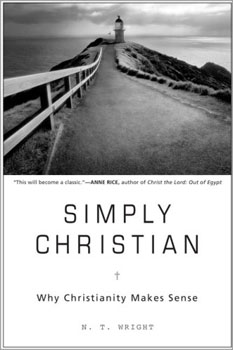About a year ago, I heard a brilliant 1 hour interview with N.T. Wright about his new book Simply Christian. It’s meant to be a introduction to Christianity and a basic apologetic in the tradition of C.S. Lewis’s Mere Christianity. I’m not sure why I put this one off so long, but I finally got a hold of a copy and read through it this week.

My verdict is that Mere Christianity still quite a bit better, though Simply Christian has some very excellent sections. Just like Lewis, Wright approaches spirituality in general and then gradually brings in central Christian beliefs and finally church mechanics. In the middle section on Jesus, Lewis stays calm and concise where Wright gets a little bit too excited and tries to deal with too many things at once. Nevertheless, his chapters discussing our desire for beauty are a really excellent and an angle completely missing from Lewis’s work. His concise overview of scripture (The Book God Breathed) is also quite useful. He doesn’t get hung up on any details.
Anyway, the book is definitely worth reading, regardless of where you are on your journey to or in Christianity. It turns out all of the very best parts were quoted in the interview I originally listed to. Smart guy. This extended excerpt begins one of my favorite parts:
One day, rummaging through a dusty old attic in a small Austrian town, a collector comes across a faded manuscript containing many pages of music. It is written for the piano. Curious, he takes it to a dealer. The dealer phones a friend, who appears half an hour later. When he sees the music he becomes excited, then puzzled. This looks like the handwriting of Mozart himself, but it isn’t a well-known piece. In fact, he’s never heard it. More phone calls. More excitement. More consultations,. It really does seem to be Mozart. And, though some parts seem distantly familiar, it doesn’t correspond to anything already known in his works.
Before long, someone is sitting at a piano. The collector stands close by, not wanting to see his precious find damaged as the pianist turns the pages. But then comes a fresh surprise. Te music is wonderful. It’s just the sort of thing Mozart would have written. It’s energetic and elgiac by turns; it’s got subtle harmonic shifts, some splendid tunes, and a ringing finale. But it seems…incomplete. There are places where nothing much seems to be happening, where the piano is simply marking time. There are other places where the writing is faded and it isn’t quite clear, but it looks as though the composer has indicated, not just one or two bars rest, but a much longer pause.
Gradually the truth dawns on the excited little group. What they are looking at is indeed by Mozart. It is indeed beautiful. But it’s the piano part of a piece that involves another instrument, or perhaps other instruments. By itself it is frustratingly incomplete. A further search of the attic reveals nothing else that would provide a clue. The piano music is al there is, a signpost to something that was there once and mght still turn up one day. There must have been a complete work of art which would now, without additional sheet music, be almost impossible to reconstruct; they don’t know if the piano was to accompany an oboe or a bassoon, a violin or a cell, or perhaps a full string quartet or some other combination of instruments. If those other parts could be found, they would make complete sense of the incomplete beauty contained in the faded scribble of genius now before them.
This is the position we are in when confronted by beauty. The world is full of beauty, but the beauty is incomplete. Our puzzlement about what beauty is, what it means, and what (if anything) it is there FOR is the inevitable result of looking at one part of a larger whole. Beauty, in other words, is another echo of a voice – a voice which (from the evidence before us) might be saying one of several different things, but which, were we to hear it in all its fullness, would make sense of what we presently see ad hear and know and love and call “beautiful.”
…Beauty, like justice, slips through our fingers. We photograph the sunset, but all we get is the memory of the moment, not the moment itself. We buy the recording, but the symphony says something different when we listen to it at home. We climb the mountain, and though the view from the summit is indeed magnificent, it leaves us wanting more; even if we could build a house there and gaze all day at the scene, the itch wouldn’t go away. Indeed, the beauty sometimes seems to be in the itching itself, the sense of longing, the kind of pleasure which is exquisite and yet leaves us unsatisfied.
Wright goes on to explain how this unmet longing is actually the voice of our creator God calling to us. Goooooood stuff.
